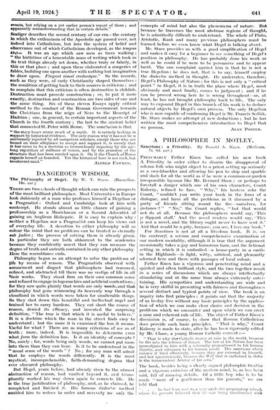DANGEROUS WISDOM.
The Phi!osophy of Hegel. By W. T. Stace. (Macmillan. 18s. net.) 'MERE are two schools of thought which can ruin the prospects of the most brilliant philosopher. Most Universities in Europe look dubiously at a man who professes himself a Hegelian or a Pragmatist : Oxford and Cambridge look at him with contempt. He stands almost as little chance of gaining a professorship as a Manichacan or a Second Adventist of gaining an Anglican Bishopric. It is easy to explain why : neither a Hegelian nor a Pragmatist can keep his views out of everyday life. A devotion to either philosophy will so colour the mind that no probb ms can be treated as eternally sub judice ; the process of solving them is already given. In particular they arc both abhorrent to the academics because they confidently assert that they can measure the degMe of truth and untruth contained in any other philosophy Here the resemblance ends.
Philosophy began as an attempt to solve the problems of life by means of reason. The Pragmatists observed with amusement and disgust that philosophers had reasoned, refined, and abstracted till there was no vestige of life in all their works. They stood firm on their own common sense and refused to engage in logomachies and artificial contentions for they saw quite plainly that words are only words,and that. philosophy had gone winnowing its heavenly way through a cloudland in which words were taken for unalterable things. So they shot down this beautiful and ineffectual angel and trained her to carry burdens. They cut short the course of reason, denied its efficacy, and invented the surprising definition, " The true is that which it is useful to believe." It is a doctrine which the man in the street finds easy to understand ; but the more it is examined the less it means. Useful for what ? There are as many criterions of use as of truth ; more, indeed. It is impossible to determine even what form the definition has. Is it an identity of concepts ? No, surely ; for, words being only words, we cannot put more into them than they can bear. Is it to be understood in the " usual sense of the words " ? No ; for any man will admit that he employs the words differently. It is the most mystical, incomprehensible, faith-deManding dogma that ever obscured philosophy.
But Hegel, years before, had already risen to the utmost abstraction of reason, had vaulted beyond it, al-A trium- phantly worked his way down again to concrete life. He is the true -justification of philosophy, and, as he claimed, he completed and finished it. His famous dialectc method enabled him to reduce to order and necessity no only the concepts . of mind but. also the phenomena of nature. But because her traverses the most abstruse regions of thought, he is admittedly difficult to understand. The whole of Plato, Aristotle, Kant and many previous philosophers must be learned before we even know what Hegel is talking about.
Mr. Stace provides us with a good simplification of Hegel and makes it easy for a beginner to sec something of liegers position in philosophy. He has probably done his work as well as he could if he were to be persuasive and to appear lucid. - The one complaint against him is that he is not a true Hegelian ; he does not, that is to say, himself employ the dialectic method in thought. He underrates, therefore, iiegel's Philosophy of Nature ; for this is not only a " critical point" in Hegel, it is in truth the place where Hegel, most obviously and most finally, comes to judgment ; and if he can be proved wrong here he is wrong throughout—or, at least, he has not brought philosophy back to life., The only way to expound Hegel in this branch of his work is to deduce natural objects by Hegel's own process. The only Hegelian who is now capable of confirming Hegel is Mr. Francis Sedlak. Mr. Stacc makes no attempt at new deductions ; but he has written the most comprehensive introduction to Hegel that we possess, ALAN PORTER.


































 Previous page
Previous page